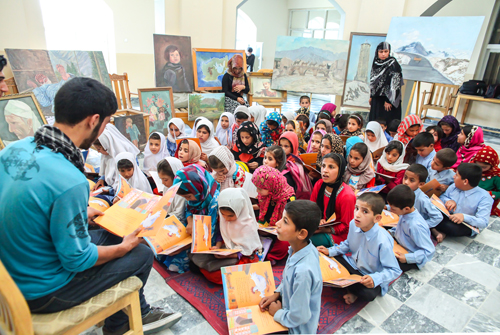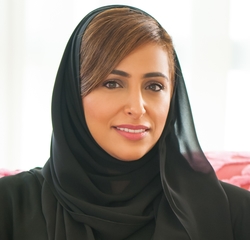
This is partly because I am a mother of three young children, and partly because I am a staunch believer in literacy, education and the power of the written word to improve and illuminate lives. And this belief is why I lead and support many literacy and reading programmes and initiatives at home in Sharjah (UAE), and abroad, especially in warzones.
Nothing more than simple human compassion for innocents caught in the crossfire – especially children – spurs me, as a publisher, to take action. These children are not only robbed of their safety and stability, but they are denied the basic human right of literacy.
This is one tragedy among many, because raising literacy rates increases children’s chances of success and fulfilment. The OECD International Adult Literacy Survey shows that literacy has a significant positive effect on a person’s income, employment prospects, physical and psychological health and social participation. Literacy is the foundation of dreams and aspirations; it can pave the way out of poverty and shine a light when the proverbial dark tunnel seems endless.
So how can we, as a publishing industry, contribute to increasing literacy, especially in war-torn countries, where the basic essentials of life are denied? Simple – by deciding to.
Here are some statistics to ponder. Recent United Nations figures show that, worldwide, at least 59 million children between six and eleven do not attend school. Of these, more than half live in conflict-affected countries. They are deprived of learning opportunities to cultivate crucial literacy skills. 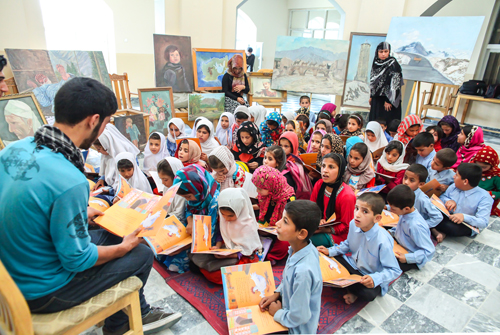
There are more than two million out-of-school children in Syria, with another 700,000 living in refugee camps in Turkey, Lebanon, Jordan, Iraq and Egypt. World Bank research shows that children in fragile and conflict-affected countries are three times more likely to drop out of school and never go back. Unsurprisingly, countries where conflict stops children from attending school have the lowest literacy levels in the world.
I have visited many of the Arab World’s conflict-affected countries. What touched me profoundly is the children’s desire and determination to pursue normal activities amid extreme and unusual circumstances. But the world’s response to the impact of war on education and literacy has been totally inadequate; hardly any aid is put towards addressing the issue. According to the UN Office for the Coordination of Humanitarian Affairs (OCHA), just four per cent of humanitarian funding for Syria has been spent on education, despite the enormity of the education crisis there. I believe this is dangerously short-sighted.
But responsibility for addressing this problem should not fall solely to the conflict-affected countries or international donors; it also needs support from the private sector, non-profit organizations and other stakeholders. And this is where we, the publishing community, come in. 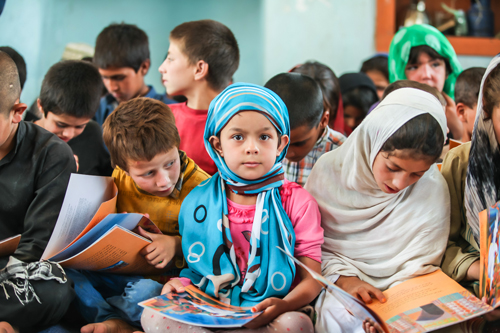
We have to do more to help foster a sense of normalcy for children in conflicts while also ensuring that they learn critical literacy skills. We must not abandon them, because we may be their best hope.
In 2012, we decided to try to bridge the education and literacy funding gap in war-affected countries by launching a fund through a partnership between the Government of Sharjah and the International Board on Books for Young People (IBBY). The $10m Sharjah/IBBY Fund for Children in Crisis provides grants for projects in Central Asia and North Africa to benefit children whose lives have been disrupted by war, civil disorder or natural disaster.
By supporting training in the therapeutic use of books and storytelling, such as bibliotherapy programmes for children facing hospitalization, poverty and displacement, and building or replenishing collections of reading materials, the Fund promotes reading as a means of psychosocial support and helps build children’s literacy.
Its strategy is to listen and learn; it identifies the most pressing yet overlooked cases through an annual call for proposals to identify projects where our support can make a meaningful difference. I am convinced that giving children a chance to read and engage their imaginations is an effective way to illuminate their present and give them a shot at a brighter future.
To date, the Sharjah/IBBY Fund has paid for projects in Afghanistan, Iran, Lebanon, Pakistan, Palestine and Tunisia. It supported the Palestine Board on Books for Young People, to renovate community libraries and rebuild their stocks of children’s literature. The refurbished libraries have also become community centres that host a variety of youth-focused activities to promote reading and community healing.
In 2013, the Fund chose to support the Afghan Board on Books for Young People. It began a mobile library project to foster reading skills acquisition outside the formal education system, such as in orphanages, displaced persons’ camps and informal schools. Already, the programme has provided over 3,000 deprived children with access to reading materials and psychosocial support through group storytelling sessions.
In 2014, the focus was on helping the Tunisian Board on Books for Young People to implement its ‘Book Boxes’ programme. This fantastic initiative develops reading materials for visually impaired and special needs children, helping them to integrate socially and training parents to encourage early reading.
It was collaborative partnerships between the public, private and non-profit sectors that made all this possible. Collectively, we are making a difference and creating readers of tomorrow – even in conflict zones.
Wally de Doncker, President of the International Board on Books for Young People said: ‘The Sharjah/IBBY Fund aims to promote a love of reading among children so that they become lifelong readers, and ensure that children have access to books. IBBY sees this as a fundamental right and the doorway to empowerment for every child. This is why the Sharjah/IBBY Fund is so important. It aims to provide support for children whose lives have been disrupted through war, civil disorder, or natural disasters, through implementing reading-related projects. It is a wonderful initiative.’
Through the magic of words and stories we can empower children who are powerless, inspire their young minds and offer them hope. Publishers can shield these children from bombs and bullets with books and the promise of a better future. 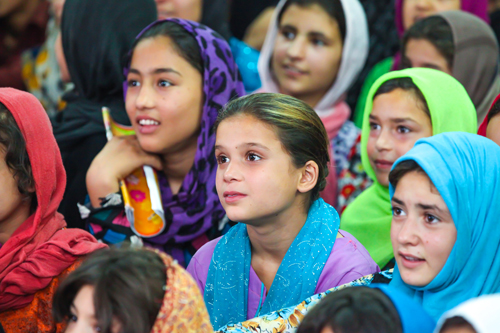
British author Phillip Pullman once said: ‘Children need art and stories and poems and music as much as they need love and food and fresh air and play.’
We need to ensure that child literacy in conflict zones is not forgotten. This is one reason why, on 23 April, World Book and Copyright Day, I launched the Kalimat Foundation to further support children in conflict countries.
The challenges I have described are formidable, but successful initiatives like the Sharjah/IBBY Fund for Children in Crisis have shown they are not insurmountable.
{loadposition literacy}
Sheikha Bodour al Qasimi is the founder and CEO of the Kalimat Publishing Group, a member of the IPA Executive Committee, and founder of the Emirates Publishers Association (EPA). The EPA is a non-profit organization established in February 2009 to serve and develop the UAE’s publishing industry. It joined the International Publishers Association (IPA) as an affiliate member in the first year after its inception and became a full member in October 2012.

